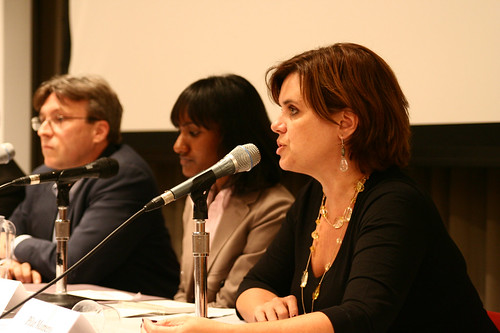Mom, Dad, I’m Voting: A First-Time, First-Generation Voter
First-time voters are getting lots of attention this year — both foreign-born Americans who have recently become naturalized citizens and American-born young people who’ve just reached voting age. Patrick Ng falls into the latter group, but he also comes from an immigrant background: he’s a first-time voter and a first-generation American.
Born in 1987 to parents who immigrated from Myanmar in the 1970s, Patrick is a filmmaker and a third-year student at New York University. He says he’s the one who brings an American influence into his family’s home, and that his parents -who are now U.S. citizens- don’t seem overly concerned with the political process in general and this election in particular. Watch him talk about this and more in this video by Feet in 2 Worlds‘ Jocelyn Gonzales:
As voters, Asian Americans don’t get paid the same attention as other ethnic groups. This is partly because they are underrepresented on the voter rolls. But they could be more important than ever this election year for one key reason: they tend to be an independent-minded voting population, without a clear, long-standing affiliation to either of the parties. Asian American voters could have a potentially pivotal role in states like Virginia and Nevada.
A “groundbreaking” national survey of Asian American voters released last week showed that a majority of them intend to vote for Barack Obama, but that also there are still very significant numbers of undecided among them. The figures were: 41% for Obama, 24% for John McCain, and 34% undecided. This contrasts with the eight percent considered undecided among the general population. [To get the National Asian American Survey, visit this site.]
Asian-Americans’ preference for Obama seems clear. Columnist Jeff Yang went as far as to ask whether Barack Obama could “be the first Asian American president?”
Patrick Ng’s heightened interest in the presidential campaign is not unusual for first-generation Asian Americans this year. It was young activists who created “Asian Americans for” websites in support of both Obama and McCain. And, across the country, young Asian American organizations are trying to build political muscle and get others involved.
Still, some wonder if Asian American young people will turn out in large enough numbers to make a difference. “Who is the Asian American vote? ” asks Glenn Magpantay, a staff attorney at the Asian American Legal Defense and Education Fund in New York. “I’m actually not sure that it’s young people,” he observes.
Speaking at a recent Feet in Two Worlds forum, Magpantay said, “Young people, especially on four-year college campuses have played a tremendous role in these elections. But for Asian Americans we actually find that 18 to 29 year olds have the lowest voter participation rates. It tends to be those over 50, it’s our parents. And so the family lacks a history of voting. The parents don’t vote because they are not citizens, the kids don’t vote either because no one has approached them about what to do. And for some political parties Asian Americans are not a reliable voting bloc.”






